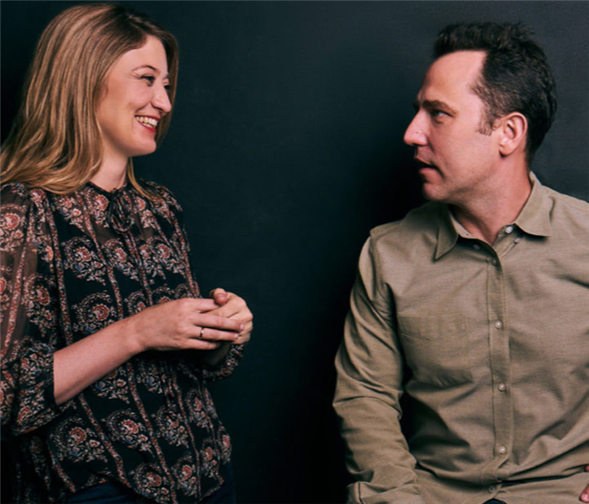Translate Page

Oliver Butler on how What the Constitution Means to Me changed him
---
Even though they had never worked together, it made sense that performer and playwright Heidi Schreck approached Oliver Butler to direct her über-personal, almost solo show What the Constitution Means to Me. As a cofounder of the Obie-winning devised theatre company The Debate Society, Butler had extensive experience creating new plays through collaboration, and Schrek thought he could help her transform almost ten years of writing into a one-act play.
Butler recalls that they first met in spring 2017 at the West Bank Café, where Schreck told him about how, at age 15, she earned money for college by giving speeches about the U.S. Constitution at American Legion posts. In the show, she recreates that experience while simultaneously commenting from her adult feminist perspective on the founding document's flaws and its impact on the women in her family. "I knew immediately that this was dramatic and theatrical," Butler says. "The play is about unpacking Heidi's personal story but also creating a conversation about whether the Constitution is even built right."
There was another reason Schreck chose Butler, but he only found out once they were deep into rehearsals for the show's world premiere at Clubbed Thumb's 2017 Summerworks festival. "When we first talked, she didn't tell me she wanted to hire a white man," he says with a laugh. "We've talked since then -- she originally worked with a woman on a few early workshops of the show -- but I'm embedded in the patriarchy in a very specific way. My enlightenment was to be part of the audience's enlightenment. She wanted someone from the inside of that to be part of the creative process. I've got to say, working on this for me has been a profoundly evolutionary experience, from someone who was trained to be an enabler of the patriarchy to becoming someone who is actively being an ally to help dismantle it."
Butler's political activism has evolved in tandem with What the Constitution Means to Me, which had a production at New York Theatre Workshop last fall that was so successful, it's transferring to Broadway's Helen Hayes Theater for a 12-week run this spring. The entire time, Butler has been upping his civic engagement (The New Yorker recently published a piece about his dedicated textavism), and he says that's because of working on the show. "My activism today is connected directly to Heidi," he insists. "There are things I learned about a woman's experience of the world that I wasn't able to see before we started this."
Even though the show is primarily Schreck's story, other perspectives are shared. Mike Iveson plays the American Legion moderator, but he breaks character to tell a real-life anecdote about toxic masculinity. And two powerhouse teenage debaters, Rosdely Ciprian and Thursday Williams, challenge Schreck at different performances. At times Schreck seems to go off-script, remarking on relevant trending news (she had a lot to say during the Ford-Kavanaugh hearings), so audiences may wonder how her castmates keep up. But Butler says her digressions are actually built into the structure of the piece.
"In our early rehearsals, Heidi would get up and, as an actor, try to do the lines she'd written, but then self-edit as the writer," Butler explains. "It created these moments where the machine sort of broke. So we had a conversation where we changed the way we worked on it. I said, 'You're going to just get up there and tell the story as you remember it, not actually be beholden to the writer's words. You have the right to say anything you want at any time.' This allowed her to be in full control of the story and how it's told. She has the safety of the script, but she also has the power to change it anytime she wants. Does she change it a lot? No. But to me, knowing that you can change it but also knowing that you are safe to do the thing that you know works, is a version of freedom. That overlaps with ideas in the Constitution: freedom and safety have to go hand in hand."
The rule that Schreck always has final say was ingrained in their artistic partnership. Whenever they had a difference of opinion, she was the one who determined how to proceed. "Heidi is super generous in that I think she listens to the things I say, but I will not try to convince her to do something I don't think she agrees with," Butler says. "She ultimately gets to decide. She wins." Now that's how you strike a blow against the patriarchy.
---
Raven Snook is the Editor of TDF Stages. Follow her at @RavenSnook. Follow TDF at @TDFNYC.
Top image: Heidi Schreck and Oliver Butler. Photo by Jenny Anderson.
TDF MEMBERS: Go here to browse our latest discounts for dance, theatre and concerts.